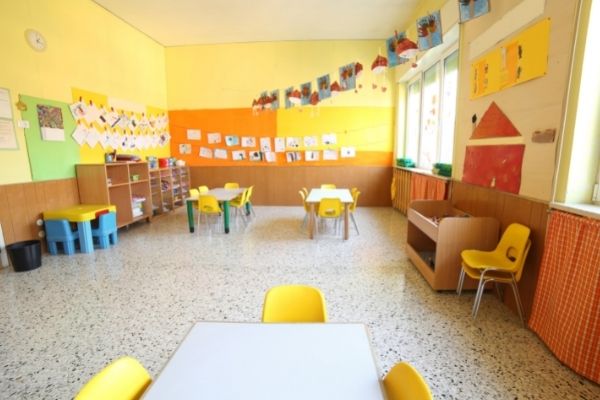Starting daycare is a daunting experience for any parent. When you add in the issue of food allergies the high anxiety experience can leave you worried for your child’s life. But for some of us, daycare is the only option we have. To get through it safely, here are a few tips for dealing with daycare and food allergies.
To deal with daycare and food allergies the best way to start is to take control of what you can. Get involved with food prep and give detailed instructions to those who you fear may not have food allergy training. Bring reminders and have paperwork for everyone involved, so you’re all literally on the same page.
Food Allergies in Daycares
Chances are your daycare will have at least one child that has food allergies already attending. Since 8% of children in the US have food allergies, about 1 in 13 children or 2 students per classroom are dealing with allergies.
Despite this growing number, you may find some schools are less prepared than others to deal with food allergies. Because food allergy education and training is different everywhere, you will have to be vocal about your safety concerns.
Get an idea of how prepared the school is during the first walkthrough or orientation. Explain how severe your child’s allergy is and ask if there are other children with food allergies.
Take a look at where the children eat and how food is handled. Be sure they understand that food allergy safety also means avoiding cross-contamination. Will children be eating allergenic foods and immediately playing with toys?
Ask every question you think of there’s no room for misunderstandings.
Food Allergies & How to Deal With Them in a Childcare Setting
To deal with food allergies in a childcare setting, all teachers and parents should be notified of a child with food allergies in a class. This means everyone knows, so no one from another class comes in and makes a mistake.
Parents share a lot of information from the start. To help with communication be ready with as much food allergy information as you can.
-
Having a doctor’s note always helps people understand the seriousness of the situation (if you’re dealing with a daycare that doesn’t understand, find another one).
-
Leave detailed instructions for the epi-pen.
-
Use food allergy cards and stickers as reminders.
-
Write out substitutes for allergies on the school’s menus so the daycare has options.
-
Have an emergency care plan.
-
Teach your child to be vocal about their food allergies.
This is no time for your child to be called picky—allow your little one to voice their opinion. Let the school know you taught your toddler about food allergies and let them question if a food is safe.
In some cases, the school may not have access to simple substitutes like soy milk for dairy. So you’ll take on the role of providing school lunch earlier than expected.
Learn to Meal Prep
With the hefty price tag of daycare, bringing your own lunch can be a problem, but with a few meal prep ideas, you can keep the cost down. The benefit of making your own lunch is you know what your child is eating each day.
Create meals for the week and take them to the school on Monday. No need to lug milk every day if the school has a full kitchen. Drop off the soymilk on Monday and have the daycare inform you when it’s all out.
This gives the providers the chance to serve the toddlers lunch with the other children. Labeling and prepping is a lot of work, but for some doing it once a week versus every day may help.
Of course, this option will require a lot of communication. This plan depends on the daycare’s style and how comfortable you are with the ability to avoid cross-contamination.
Take Advantage of Bento Boxes
Make lunch with your toddler’s favorite foods in a bento box. Add crackers, lunch meat, fruit, veggies, and their favorite dip. A bento box doesn’t have to mean big expensive lunches your toddler doesn’t want. Keep it simple and change up the ingredients and it’ll always be fresh.
Sometimes it’s best to choose options that don’t have to be heated so handling is kept to a minimum. However, when you want add a sandwich or dinner the day before and use your regular fruits and veggies as sides.
Skip Breakfast (If You Can)
My boys are allergic to eggs. I’m lucky enough to work from home, so when eggs are for breakfast at daycare, I drop them off a little later. They skip breakfasts they can’t eat at school and have breakfast at home.
If that’s not an option pack up breakfast on the go and always remind the daycare they already ate or they have their own.
When it comes to lunch, give in to your child’s demands. No point in creating beautiful nutritious meals they don’t want. If they want seed butter and jelly three days in a row, don’t feel bad for giving it to them. You still have dinnertime at home to fill the gaps.
While these tips may not get rid of all your fear, being prepared can help put your mind at ease. Making notes on the weekly or monthly menu will keep everyone stay up to date at every meal. Using eye-catching stickers and food allergy cards on bookbags and cubbies is a fun way to use reminders.
When substitutes aren’t an option, bring your own lunch. Meal prepping with bento boxes and skipping breakfast at school can keep costs low. Choose your child’s favorites to ensure they eat every bite.
Starting daycare is hard, but you can get through it, even with food allergies. Once you witness the fun your child has making friends and bringing home artwork, you’ll see why it’s worth it











